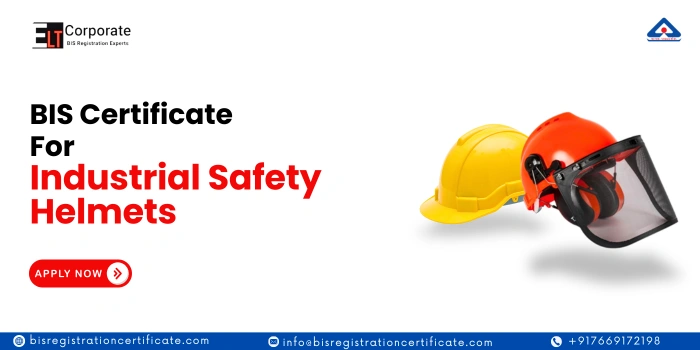Safety begins with the right equipment in the industrial sector, and helmets are a cornerstone of worker protection. Obtaining a BIS Certificate for Industrial Safety Helmets for manufacturers and suppliers is important in meeting Indian standards. The BIS License guarantees that the helmets comply with all mandatory safety requirements, fostering trust among consumers and regulatory authorities.
As a trusted B2B service provider, we specialize in simplifying the BIS certification process for industrial safety helmets. From understanding regulatory requirements to managing documentation and liaising with BIS authorities, our expertise ensures a hassle-free certification journey for your business.
This article provides an overview of the BIS certification process, its importance, and how our services can help manufacturers and suppliers achieve compliance efficiently. Let us handle the complexities while you focus on delivering quality products to your clients.
Overview Of IS 2925: 1984 BIS Certificate For Industrial Safety Helmet Standards
IS 2925: 1984 is the Indian Standard that defines the requirements for industrial safety helmets, focusing on their components, design, workmanship, and finish. This standard ensures that helmets provide reliable protection against hazards such as falling objects. It makes them essential in industries like construction, shipbuilding, mining, tunnelling, and quarrying, where workers face significant risks of head injuries.
The standard guarantees that helmets are durable, dependable, and capable of protection in demanding environments. It also outlines strict performance requirements to ensure helmets meet safety and quality benchmarks, minimizing the risk of injury and enhancing worker safety in hazardous conditions.
What Is BIS Certification For Industrial Safety Helmets?
A BIS Certificate for Industrial Safety Helmets ensures that industrial safety helmets meet specific quality and safety requirements set under the IS 2925:1984. This certification is essential for manufacturers and suppliers of helmets for use in industries. Such as construction, mining, shipbuilding, and more, where workers face the risk of head injuries from falling objects, impacts, or electrical hazards.
The BIS certification ensures that the helmets are:
- Durable and provide reliable protection.
- Manufactured according to strict design, component, and performance specifications.
- Tested to meet specific safety benchmarks that reduce the risk of injuries in hazardous work environments.
- Compliance with legal and regulatory requirements for market access in India.
Importance Of BIS Certification For Industrial Safety Helmets [IS 2925:1984]
Here’s why obtaining a BIS certificate for Industrial Safety Helmets is essential:
- Ensures Compliance with Safety Standards: BIS certification ensures that industrial safety helmets meet the highest safety standards as outlined in IS 2925:1984. This specification covers all aspects of helmet design, quality, etc. Ensuring helmets are capable of protecting from any kind of injuries.
- Boosts Consumer Confidence: Helmets bearing the BIS Mark are recognized for their quality and compliance with established standards. This helps build trust among workers, businesses, and regulatory authorities, assuring that the helmets meet the necessary safety requirements.
- Guarantees Worker Protection: Industrial safety helmets certified by BIS are guaranteed to provide reliable protection in hazardous work environments.
- Market Access and Legal Compliance: In India, BIS certification is mandatory for selling industrial safety helmets. Compliance with IS 2925:1984 ensures that manufacturers can access the Indian market and meet legal requirements for safety equipment.
- Quality Assurance and Durability: Certified helmets are tested for their durability and resistance to impacts, ensuring they remain effective over time. The certification ensures that helmets are made with quality materials, offering long-lasting protection for workers.
- Prevents Legal Issues: BIS certification helps manufacturers and employers avoid legal complications related to non-compliance with safety regulations. In the event of an accident, certified helmets provide proof that the employer adhered to safety standards.
How To Obtain BIS Certificate For Industrial Safety Helmets?
Securing BIS Certification for industrial safety helmets involves a systematic process to ensure compliance with Indian safety standards. Here’s a concise guide:
- Understand IS 2925:1984 Standards: Familiarize yourself with the standards covering design, material quality, and performance requirements for industrial safety helmets.
- Prepare Documents: prepare documents such as Form V from the BIS portal, product details, test reports, and quality management system documents.
- Product Testing: Submit helmet samples to a BIS-approved lab for testing and obtain a compliance report.
- Submit Application: Complete the application online on the BIS portal by uploading the required documents and test reports followed by fee payment.
- Factory Inspection: BIS officials will inspect your manufacturing unit to verify compliance with IS 2925:1984 and quality control standards.
- Certification Approval: Upon successful inspection and verification, BIS will grant the license to use the BIS Standard Mark.
Documents Required To Obtain BIS Certification For Industrial Safety Helmets [IS 2925:1984]
To get BIS Certificate for industrial safety helmets, manufacturers must submit the following documents:
- Application form (Form V)
- Applicant’s ID and address proof
- Declaration letter of compliance
- Product specifications and design details
- Test report from a BIS-recognized lab
- Internal quality documentation
- Proof of ownership or lease of the manufacturing unit
- Description of manufacturing processes
- List of important raw materials and components
- Factory layout
- Production process flow chart
What Is The Short Title And Commencement Of The Order?
The Order is officially called the Helmet for Police Force, Civil Defence, and Personal Protection (Quality Control) Order, 2023. It was enforced six months after publication in the Official Gazette, with a later enforcement period for micro, small, and medium enterprises.
What Does Conformity To Standards Mean For Industrial Safety Helmets?
Helmets and related products must adhere to the Indian Standard mentioned in the Order. Specifically, industrial safety helmets must comply with IS 2925: 1984, which outlines the necessary design, safety, and performance criteria.
Products must display the Standard Mark granted under a BIS license, as outlined by the Bureau of Indian Standards (Conformity Assessment) Regulations, 2018.
What Is The BIS Standard For Helmets?
The BIS standard for Industrial Safety helmets is IS 2925:1984, which specifies safety, design, and performance requirements to protect workers from head injuries. Other helmets, like those for firemen and police, follow standards such as IS 2745:1983 and IS 9562:1980.
What Are The Specifications For Industrial Safety Helmets?
As per IS 2925:1984, industrial safety helmets must be designed with durable, impact-resistant materials to protect against falling objects, impacts, and electrical hazards. They should provide a comfortable fit with adjustable straps and proper ventilation for extended use.
The helmets must also be resistant to wear and environmental conditions, ensuring long-lasting durability. Additionally, each helmet must bear the BIS Standard Mark to signify safety and quality standards compliance.
Is Code 2925 1984 Specification Industrial Safety Helmet?
Yes, IS 2925: 1984 is the Indian Standard for industrial safety helmets, ensuring protection against injuries.
What Are Industrial Safety Helmets?
Industrial safety helmets are protective gear designed to prevent head injuries from impacts, falling objects, and electrical hazards, used in industries like construction and mining.
What Is Indian Standard 2925: 1984?
IS 2925: 1984 is an Indian standard that outlines the specifications for industrial safety helmets designed to safeguard workers from head injuries in hazardous environments.








